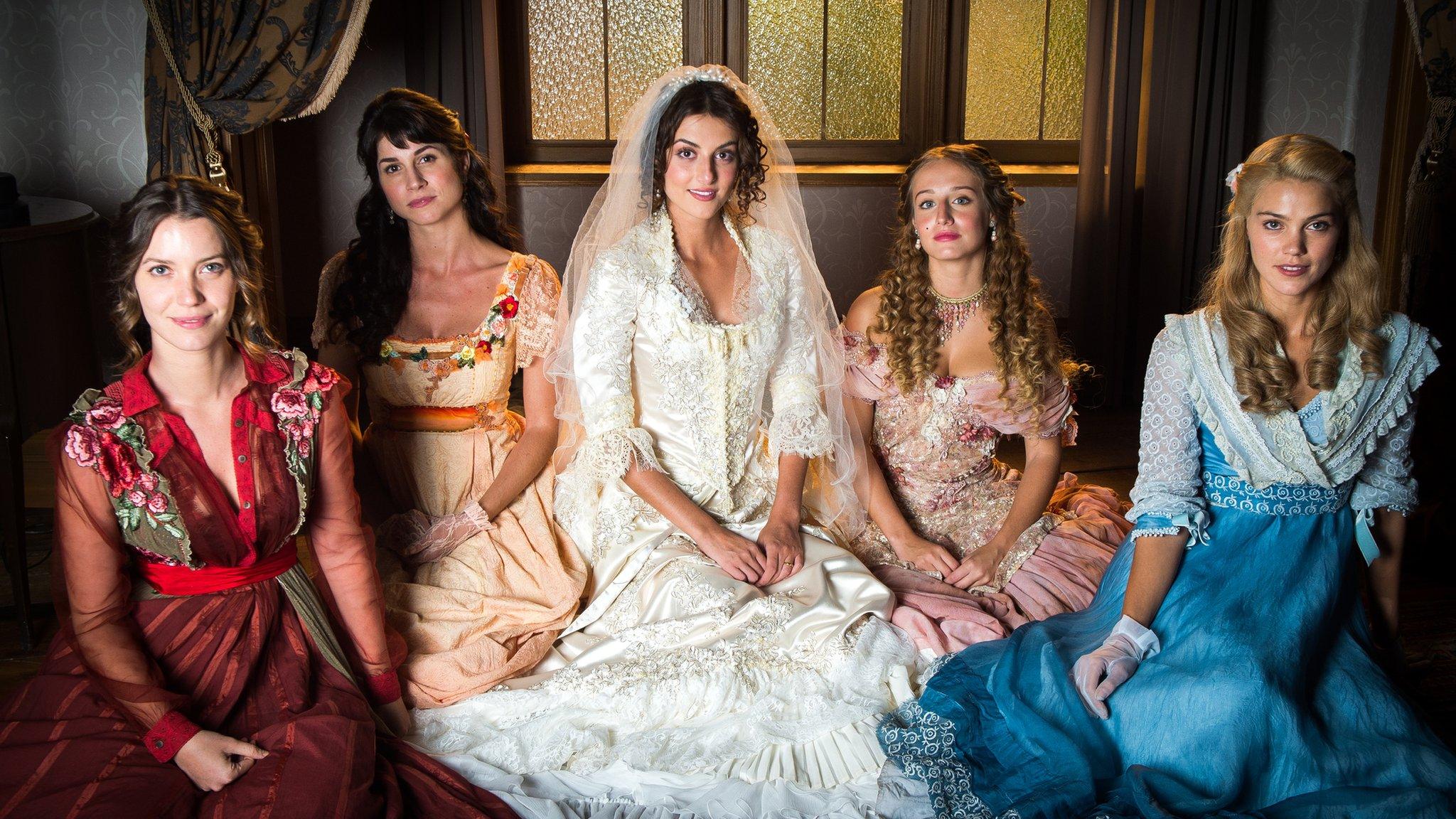Why Austen's Emma would be 'queen of social media'
- Published
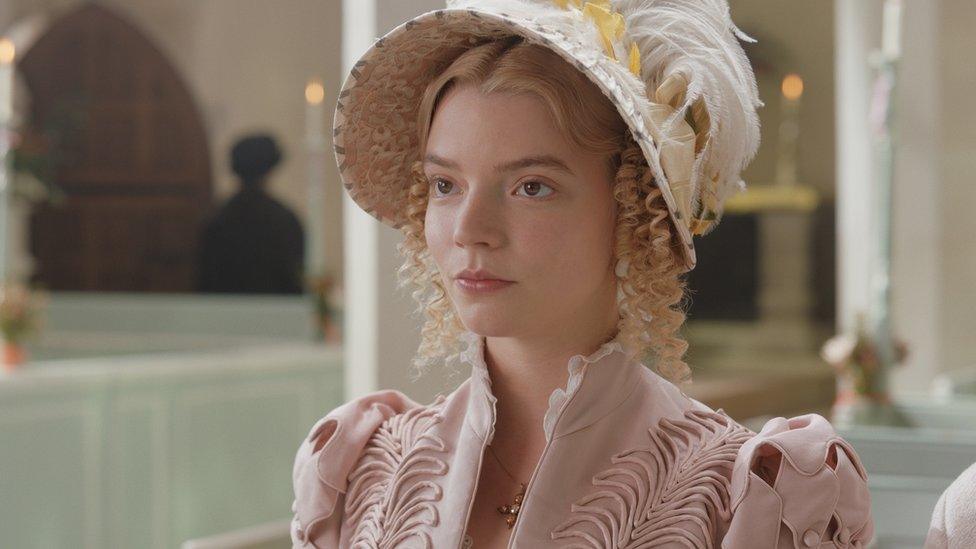
Anya Taylor-Joy plays the film's heroine
There are plenty of screen adaptations of Jane Austen's Emma - faithful ones like the earliest BBC version of 1948 to Clueless, which moved the action to 1990s California. Director Autumn de Wilde's film returns Emma to Regency England - but with a lot to say about life in 2020.
De Wilde made her name as a stills photographer and directing videos for bands like Florence + The Machine and Death Cab for Cutie.
It's not a career path automatically associated with someone making her feature film debut with a Jane Austen adaptation. But de Wilde is a far from standard Hollywood product and her love for the story is obvious. She's fascinated by what Austen's insights still tell us today.
"I didn't care about modernising the world that Emma exists in but I did care about humanising it for a modern audience," she says.
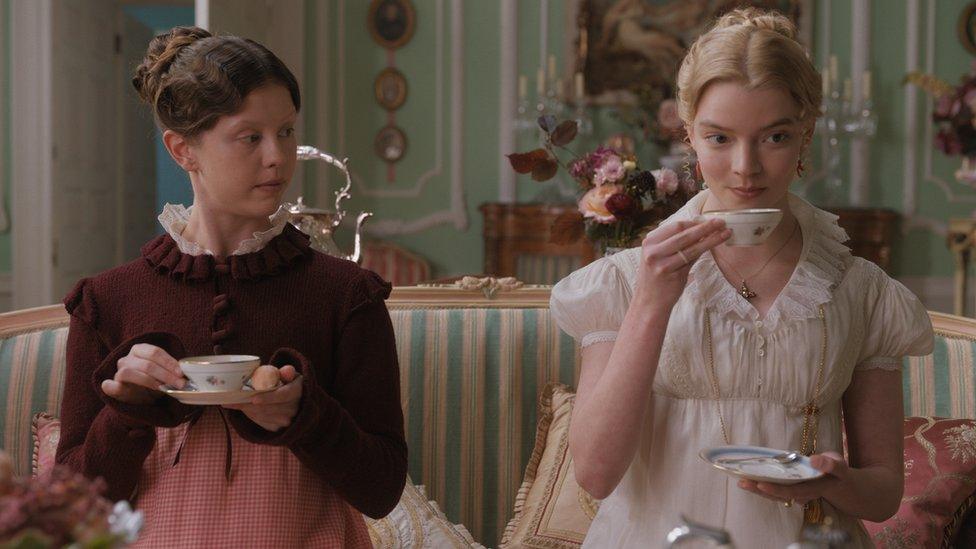
Harriet, played by Mia Goth (left), seeks romance advice from Emma
"We still have the same set of problems. There are bullies and the people who are so sure they're not bullies but really they are. There are the same social pressures. There are class divisions and we're having these invisible wars on the internet. I don't think humans are changing that much.
"Our world is basically on fire and all hell has broken loose - or maybe we're only now seeing it for real.
"But in the middle of all this we have the same personal issues that Austen wrote about 200 years ago. We think, 'Oh I wonder if so-and-so likes me.' Or 'You're my best friend so now you have to do a certain thing'. All that 'I hate him - I love him - I want you all to myself' stuff never goes away. Is that fact comforting? Sometimes I think it's terrifying."
Some Austen fans find the novel's central character Emma Woodhouse the most fascinating of her heroines. At the start of the story, published in 1815, Emma seems supremely self-confident but her wit can lacerate.

Austen shows her learning a degree of humanity and finally identifying the right turnings in the great maze of relationships.
In the new version she's played by Anya Taylor-Joy. At 23 she has already attracted attention in films such as Thoroughbreds and Split.
"I think if Emma were alive today she would start out as queen of social media. She'd be living her life through a filter and trying to present herself in a certain way. But by the end of the story Austen wrote she's changed so I suspect she would take a break and go travelling to try to find herself," says Taylor-Joy.
"At least as we first meet her she's confident that she knows how other people should be living. She's a dictator of taste and would make a perfect social media influencer."
Taylor-Joy says de Wilde too is a sort of modern Emma but quickly adds that in her case that's a positive. "Autumn puts people together well and makes matches brilliantly, which is what my character thinks she's good at.
Allow YouTube content?
This article contains content provided by Google YouTube. We ask for your permission before anything is loaded, as they may be using cookies and other technologies. You may want to read Google’s cookie policy, external and privacy policy, external before accepting. To view this content choose ‘accept and continue’.
"Autumn helped me a lot in places where we had to modulate Emma's character. Sometimes she's mean and uptight but at times she's more sensitive. So there were scenes, like when I'm arguing with Johnny Flynn [who plays George Knightley], when Autumn would keep the camera rolling and we'd shoot several times over without a break but with slightly different thoughts in Emma's head each time. It was exhilarating to act."
Taylor-Joy says it's still very rare to find a film with a female central character, female screenwriter and female director. "It would be good to think that next time the film awards will show things are changing."
She says most people know someone like Emma, or perhaps have aspects of her.
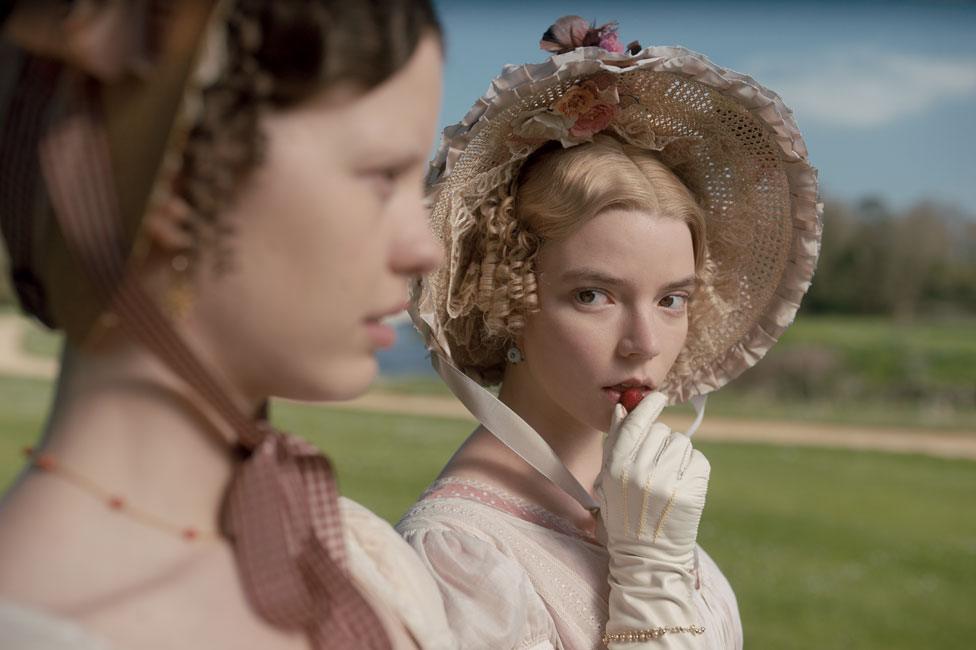
"Definitely there are times when I wanted to shake Emma. Without giving too much away, there's a crucial moment when she says something cruel to the character Miss Bates [Miranda Hart]. Miss Bates is devastated and it was a tough scene to play - but I went up to Miranda afterwards and gave her a big hug."
After 205 years it's probably no spoiler to say that towards the end of the story Emma starts to realise the true nature of her feelings for her friend and brother-in-law George Knightley.
"Emma initially is clearly a young person with a journey to go on," Flynn says. "But I think she engages your compassion because she has a lot to learn about herself.
"If you write her off too early you're really writing off all young people. Because aren't we all like that at 20 or 21? You think you know the world so well and then you have an experience which allows you to take stock of what you don't know."
Flynn thinks double standards are at play in the way Emma is judged as a young woman.
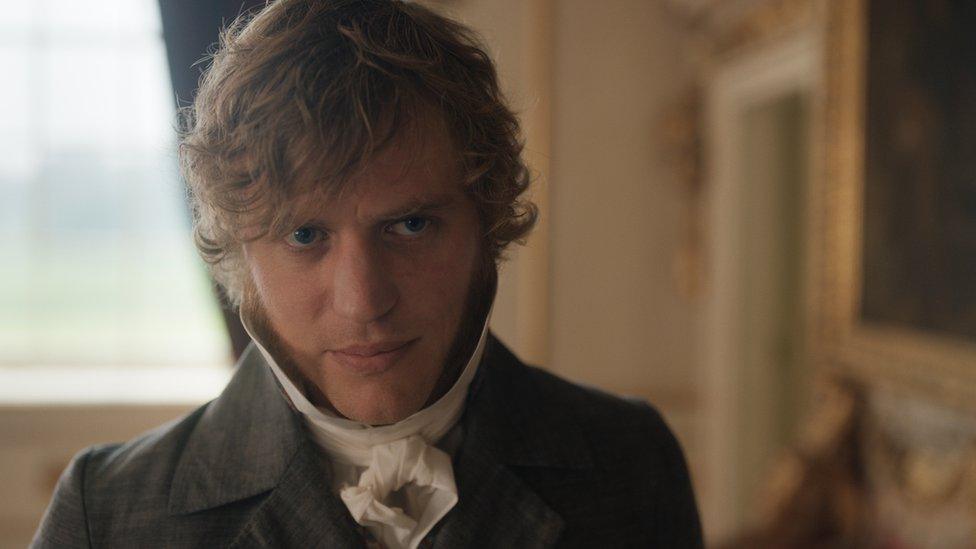
Johnny Flynn plays Mr Knightley
"In a young male hero, brilliance and precociousness might be interpreted as wit and flair. But the same characteristics in a woman might be deemed irritating. I think Jane Austen was aware of that."
The New Zealand writer Eleanor Catton had to construct a dramatic form for Austen's story.
In 2013 her novel The Luminaries won the Man Booker prize (she's the youngest winner yet) and she's also written the six-part BBC Two adaptation to be seen later this year. She says adapting her own novel was such a gruelling process that she was delighted to be asked to take on the Austen.
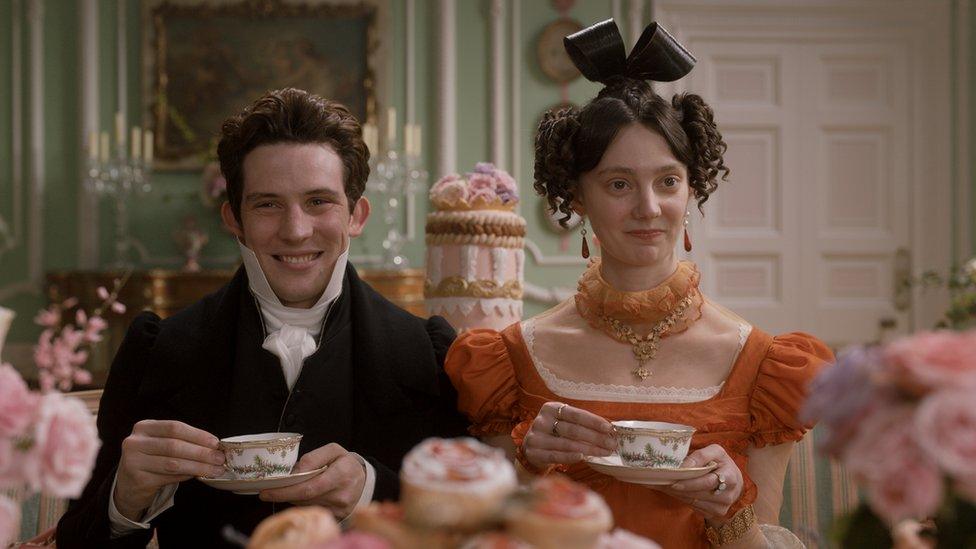
Josh O'Connor (recently seen in The Crown) plays the Mr Elton the vicar while Tanya Reynolds (from Sex Education ) plays his wife
"My relationship with my own work is more fraught because I know what could have been on the page but isn't. As an adaptor you start out as a reader and that's totally different. I'd never read the book and when I did I found the form of it is so perfect.
"But with Autumn de Wilde we didn't only talk about the narrative and formal elements - we spoke about the plight of all the characters. Autumn brought a warmth to that which was a massive help.
"We both loved the original but more importantly we loved it for the same reasons. And I think we agreed on what didn't work in some adaptations. But films are intensely collaborative and there's huge input from the cinematographer and others - and of course from the cast.
"Josh O'Connor, for instance, plays Mr Elton the vicar with a lot of humour. And early on Bill Nighy made certain points about how I'd written the role of Emma's father and we changed the characterisation."
Most of the film was shot at Firle Place in East Sussex, which Catton visited to watch some of the filming.
"You're very aware that the writer is the one person who has nothing to do. You end up bumping into the set and tripping over power cables.
"But It makes for a very heady spirit and it's very easy to fall in love with everybody around you. Especially because actors tend to be very good-looking - that makes it even easier. It's not like writing a novel."

Follow us on Facebook, external or on Twitter @BBCNewsEnts, external. If you have a story suggestion email entertainment.news@bbc.co.uk, external.
- Published26 July 2019
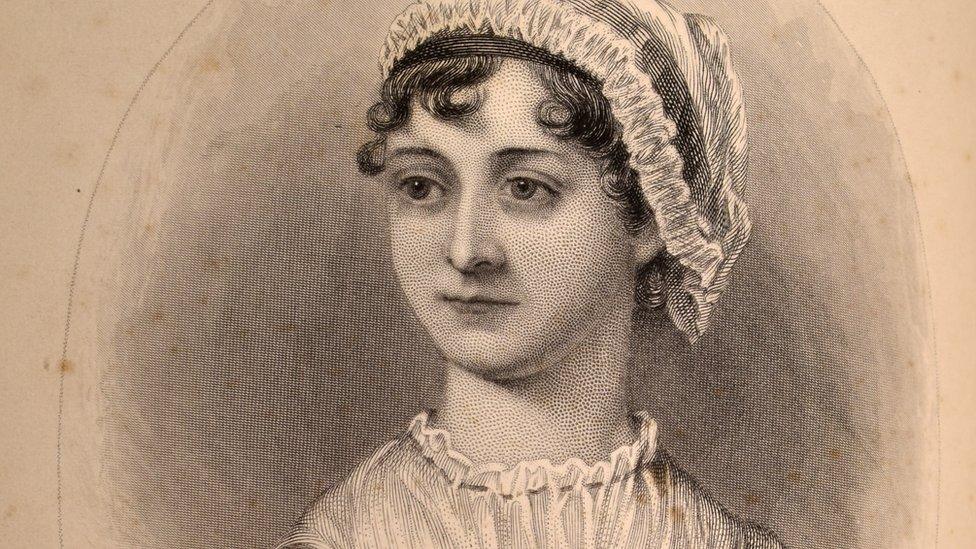
- Published27 July 2019
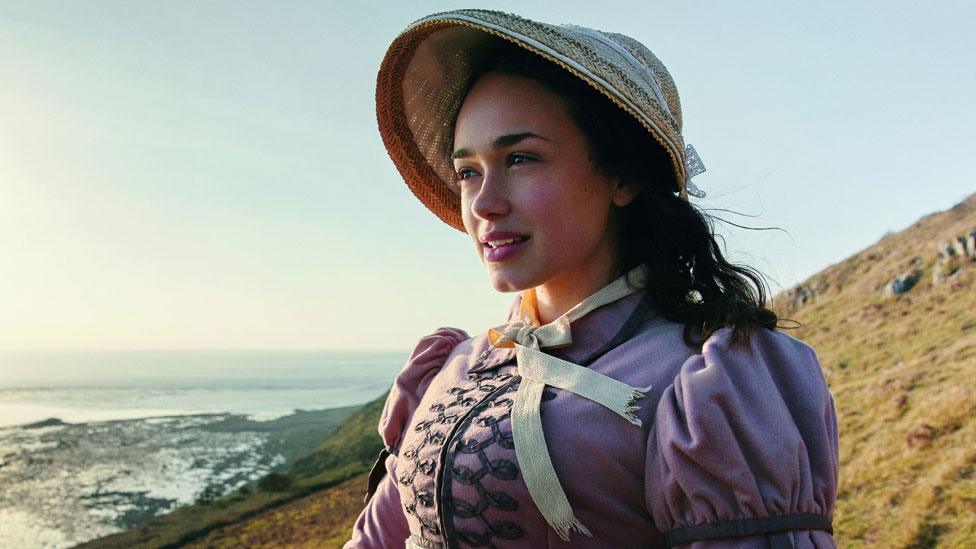
- Published1 November 2018
